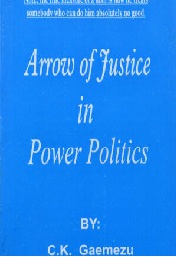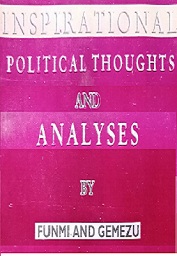One among the cosmic differences between man and other animals is the
degree of attainment of power or wealth in an organized environment. Furthermore, man, assumed to be a political animal is at the centre stage of power
politics or political power struggle and supremacy.
In fact, the phenomenon known as power is a paradox. It is sweet; very
sweet indeed. Unfortunately, those who drink from its nectar often go drunk.
Everybody wants to acquire it. Those who have acquired it already do everything
they can to consolidate and maintain it. It is the said sweetness, the intoxicating
effects of it and the ambition to consolidate and to maintain it by one who had
already acquired it makes the game of politics one of a ‘do or die` affair and \’I or
no one else’ syndrome associated with struggle for political power acquisition. Explaining
more on this, a friend and colleague in the arts, Mr. Fidelis Akamere while
quoting authorities in his book – Issues and Concept in Government and Politics
of Nigeria made the following statements; Power is the ability to do something. However, in politics, it means more than just that.
According to Prof. Humphrey Nwosu, “power possession invariably
involves the ability to do something, to act, to enforce, sometimes to reward the
compliant, persuade the recalcitrant, punish the offender, mediate over conflict
and coerce the Intransigent.” One may therefore define power as the use of
resources to obtain the compliance or command the obedience of others. In other
words, power is the use of resources to make others to obey you. Resources
referred to here include material resources like money as well as access to means
of production. Others include intangible resources viz; Charisma, esteem,
prestige, social status, knowledge, political position, strong connections etc.
Niccolo Machiavelli (1469- 1527), an Italian statesman is generally
regarded as the architect of power politics. In his book- The prince, he marshaled
out strategies for acquiring and preserving power. For him, power and the guest
for it is a zero- sum game; indeed a do or die affair. Side by side with power is the
concept of influence. The question of who has power in politics is in most cases
accompanied by the question of who has or who exerts the most influence. This is
why Harold Laswell described politics as the study of influence and of the
influential. Influence, he said, is “participation in decision about relatively milder
sanctions.” Some writers use power and influence interchangeably. But one may
influence a decision while having no power to alter it. Power is the “capacity to
change the probability of outcomes.” It is the key concept in politics. The
question of who gets what, when, and how revolves around the acquisition, and use of power for the acquisition of other values. Power can be acquired
through the electoral process, appointment, and inheritance or usurpation i.e. by force
e.g. via a coup d’état.


Reviews
There are no reviews yet.